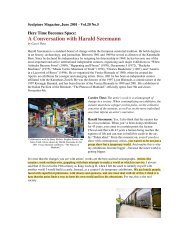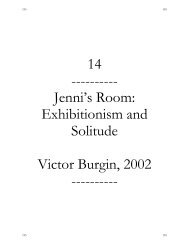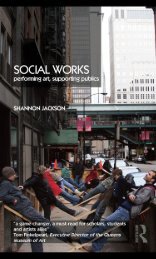Untitled
Untitled
Untitled
Create successful ePaper yourself
Turn your PDF publications into a flip-book with our unique Google optimized e-Paper software.
Beyond Diversity<br />
It is the radical, the apocalyptic end of history—not the kind of end-of-history<br />
as is described by contemporary liberal theory. That is why the only real<br />
heritage of today’s post-Communist subject—its real place of origin—is the<br />
complete destruction of every kind of heritage, a radical, absolute break with<br />
the historical past and with any kind of distinct cultural identity. Even the<br />
name of the country “Russia” was erased and substituted by a neutral name<br />
lacking any cultural tradition: Soviet Union. The contemporary Russian,<br />
post-Soviet citizen thus comes from nowhere, from the degree zero at the end<br />
of every possible history.<br />
Now it becomes clear why it is so difficult for cultural studies to describe<br />
the way that post-Communist countries and populations evolved after the<br />
demise of Communism. On the one hand, this path of evolution seems to<br />
be the familiar, well-worn path from a closed society to an open society, from<br />
the community to a civil society. But the Communist community was in<br />
many ways much more radically modern in its rejection of the past than the<br />
countries of the West. And this community was closed not because of the<br />
stability of its traditions but because of the radicality of its projects. And that<br />
means: the post-Communist subject travels the same route as described by<br />
the dominating discourse of cultural studies—but he or she travels this route<br />
in the opposite direction, not from the past to the future, but from the future<br />
to the past; from the end of history, from posthistorical, postapocalyptic time,<br />
back to historical time. Post-Communist life is life lived backward, a movement<br />
against the flow of time. It is, of course, not a completely unique historical<br />
experience. We know of many modern apocalyptic, prophetic, religious<br />
communities which were subjected to the necessity of going back in historical<br />
time. The same can be said of some artistic avant-garde movements, and also<br />
of some politically motivated communities that arose in the 1960s. The chief<br />
difference is the magnitude of a country like Russia, which must now make<br />
its way back—from the future to the past. But it is an important difference.<br />
Many apocalyptic sects have committed collective suicide because they were<br />
incapable of going back in time. But such a huge country as Russia does not<br />
have the option of suicide—it has to proceed backward whatever collective<br />
feelings it has about it.<br />
It goes without saying that the opening of the Communist countries<br />
has meant for their populations, in the first place, not democratization<br />
in political terms but the sudden necessity of surviving under new economic<br />
154 155







